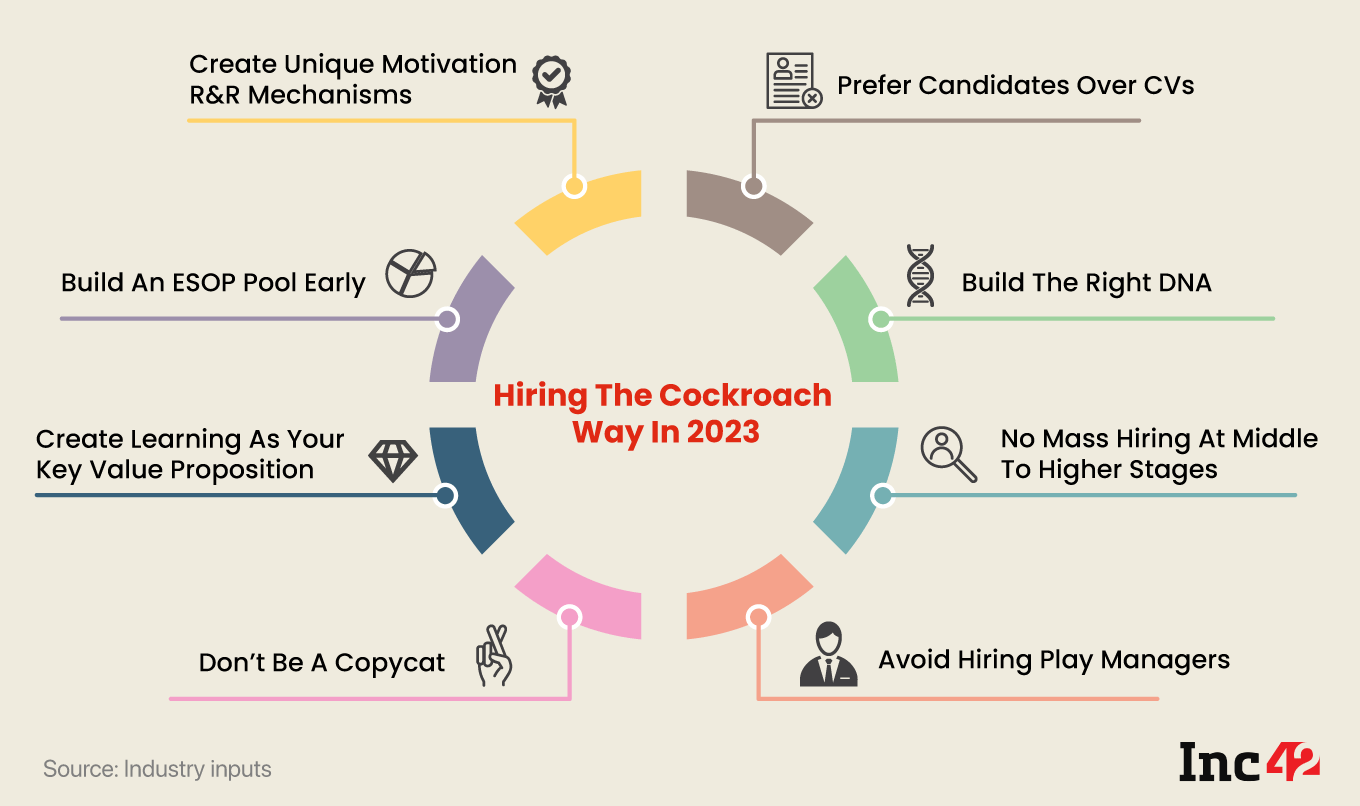A cockroach startup would look more at nurturing managers, who have mastered their skills and can lead by example.
ESOP can play an important role in attracting top leadership talent to the startup in the initial days
The pressure from clients and investors may force a startup to hire in bulk or at inflated pay packages, but you should stick to what’s right for the business
In the preceding articles of our series on cockroach startups, we tried to understand the basic tenets of cockroaches, how they are hardwired to survive even in the direst of situations, their strategies in building long-term sustainable cash reserves, and the tendency to look the other way even if the market is flushed with investors.
The next most crucial aspect for any company to survive as a cockroach is building a team that is in sync with its strategic goals.
The year 2022 is a perfect example of how many in the Indian startup ecosystem suffered due to flamboyant hiring decisions. With more than 22K layoffs amid the ongoing funding winter, the Indian startups are undisputedly in a bad shape currently.
According to Asit Kumar, chief human resource officer (CHRO) at fintech soonicorn Lendingkart, rapid hiring, selecting the best from the market,and hiring employees with niche skills have taken priority over some of the fundamentals of hiring principles such as internal parity and compensation benchmarks last year, splurging a lot on hiring quickly and disturbing the hiring dynamics across industries.
Consequently, the jolts of what followed next, amid the global economic meltdown, are being felt even today in the form of deferred salaries, cancelled annual appraisals, hiring freezes, role reversals and the worst of them being mass layoffs.
“Owing to this, 2023 is touted to be the year of cockroach startups because they choose sustainable models to scale up rather than purely depending on the amount or number of available resources – be it capital or human,” said Visakh Sasikumar, the CEO of Fyn Mobility, a Bengaluru-based EV startup, who has been there and done that.
Giving insights into the cockroach mindset, Sasikumar took us through his entrepreneurial journey, which he started in 2013 in the basement of a building.
“There was no rush, I took six years to build a team of 10-15 people. Even though we have expanded to three cities today and have a headcount of 60 employees, our product team is the leanest ever – five people to assemble the hardware and one tech guy to build the software platform. We have not only scaled but also what we have built and launched is in the sub-INR 1 Cr range, a lot lower than what many could spend anywhere between INR 50 and INR 60 Cr,” Sasikumar said, adding that he has seen EBITDA growth of 100% YoY as of FY21.
Sasikumar could make this possible because he stayed away from splurging on advertising and product development. “However, the major cost saving was done by hiring the right way – a trait every startup aiming to build with a cockroach mentality must possess,” the CEO of Fyn Mobility said.
Nevertheless, it is always easier said than done. According to Hyderabad-based talent recruitment platform, Workruit’s founder and CEO Manikanth Challa, there are a lot of challenges in making a lean startup. “But with short and long-term goals in place, lean teams can prove to be more effective if built well.”
Building Team The Right Way
In our endeavour to find out more about how to build lean teams and how the ‘roach approach’ could be the answer to quality hiring for startups, we spoke with many HR experts and industry leaders. Here are the most interesting takeaways on how to hire the cockroach way.

Prefer Candidates Not Profiles
A structured hiring process involves taking written tests or employing external HR consultants to filter out the candidates based on their resumes or applications collected from any source.
However, Sequretek’s cofounder Pankit Desai believes that no written test, or resume, can define the actual potential of a candidate. The effort must be towards identifying the attitude rather than aptitude, as the latter can still be taught.
“When we hire from various educational institutes or colleges, we make sure that we meet each and every individual to identify the best fit for the company, irrespective of their scores. For instance, in the 2018 hiring process, we met a guy who failed a written examination, but after meeting him, we found that he holds a year of experience in the security domain, which was much more relevant to us than any fresher joining the brigade,” Desai said.
Build The Right DNA
If the culture is not set right from the first time, it becomes difficult to make people trust your organisation. Also, it is imperative to understand that the initial days of business are not going to be a bed of roses, and you may have to find people who can make their way through limited resources and scale the business. This is how you make the DNA of your organisation stronger, managers empathetic, and employees loyal.
“We have pivoted thrice. Therefore, we know that when you pivot to a new model, the entire team has to rethink the way they were thinking before. My manufacturing team started getting converted into a high-end as a service company, and this was possible only because the culture is in their DNA. Building a 9-5 work shift is not a culture a cockroach startup can afford. It needs people who are ready to do anything at any time, put the team first, and work towards common goals, which is business,” Fyn Mobility’s Sasikumar said.
Giving further clues to crafting a flawless corporate DNA, the experts opined that people with less than a year of experience are easier to shape as per startup’s culture. However, the ones with 3-6 years of experience may interfere with the company’s DNA, as they have already developed a certain style of work.
Avoid Play Managers
The experts Inc42 spoke to unanimously believe that hiring managers who have no idea of the on-ground work process will only add layers versus value to the team. However, a cockroach startup looks at nurturing managers, who have mastered their skills and can lead by example. Having an eye for detail and not leaving their core are the key qualities one should look for in a manager.
Surprisingly, Meta Platforms is doing a similar thing. According to recent reports, the social media giant is now flattening its organisation structure and managers are now being asked to have individual contributing jobs rather than just managing teams – paving the way for value creation versus layers.
Further, experts added that founders should review existing roles and new openings every quarter to avoid redundancy of roles and make way for better succession planning internally rather than hiring managers from outside.
They said that the cockroach way is to stay away from heavy tech teams to save costs and manage senior and middle-level roles between cofounders for as long as possible.
Create Unique R&R Mechanisms
According to industry experts, materialistic rewards and recognition mechanisms may not prove to be fruitful in the long run, particularly for early-stage startups.
One can always create unique processes to reward and recognise their employees. For instance, a hardcore techie may feel more motivated with hackathons, tech talks from industry leaders, and occasional outings with the team. On the contrary, a customer-facing team may need to break away from the monotony at frequent intervals.
“Crafting a successful rewards and recognition program is not just about copying what others do. It’s about being smart and empathetic in your approach towards your employees,” Lendingkart’s Kumar said.
These kinds of mechanisms make people stay and strengthen the company’s internal culture, even during downturns.
Build An ESOP Pool Early
According to Lendigkart’s Kumar, ESOP can play an important role in attracting top leadership talent to the startup in the initial days. The idea of increasing the valuation of the company, while increasing their own wealth, can help founders leverage the hefty compensations.
For instance, in the year 2022, the Indian startup employees made over $196 Mn, through buybacks. While in 2021, the startups helped employees make more than $335 Mn through ESOPs.
As per industry standards, tech startups can keep an ESOP pool of anywhere between 10% and 15%. At the same time, the ESOPs should be allotted in phases rather than all at once.
“Managing an ESOP pool should be more like a 70:20:10 ratio, where 70% of ESOPs go to actual business employees, 20% to second-tier or mid-tier management, and the remaining for everyone else,” said GamerJi founder Soham Thacker.
Create Learning As Your Key Value Proposition
Compensation wars are common in the industry. Unless one is a VC-funded startup, one cannot afford to pay INR 45 Lakh a year to a five-year experienced cloud expert. This is an unsustainable practice.
Startups should focus on hiring people who are at the early stages of their career and can value the exposure and learnings over hefty pay packages.
According to Sequretek’s Desai, such employees eventually find other levels of motivation, for example creating long-term value by learning secondary skills, rather than fancying luxurious trips and BMW cars.
Shape Interns Into Employees
According to HRtech startup Keka’s founder Vijay Yalamanchili, the primary way to keep hiring costs low is to hire more interns, train them, and then retain the ones you see adding value to the business. Also, most founders we spoke to do not prefer hiring from IITs, IIMs, or other premier institutes.
“If you hire freshers and pay them INR 3 Lakh to INR 4 Lakhs a year in salaries, you cannot fire them easily, even if they do not perform. This also gives rise to a mediocre team. However, in an intern-led model, if you hire 20 interns for three months on a monthly salary of INR 15K each, you end up saving a lot on your recruitment cost. Further, in the end, you get candidates who believe in your vision, take ownership and are committed to the core,” he added.
Food For Your Thought
The aforementioned statements are especially true when we have examples of what happened in 2021 – how crazy packages disturbed the overall job market. Interestingly, the short-lived fad was to no avail.
According to media reports, many IT companies gave 100% hikes, paying as much as INR 60 Lakh per annum to a 10-year experienced employee. Fintech unicorn BharatPe even gave away BMW bikes to new joinees of its tech team and product managers.
Scenarios like these often force startups to hire talent at inflated pay packages or retain employees with unsustainable perks. Experts preach that one should stick to what’s right for the business.
According to Keka’s Yalamanchili, 2023 will give many opportunities to startups to hire the right talent. This is because the startup job market is going through a course correction in the aftermath of the layoffs last year. However, while picking from the existing talent pool, founders will have to control their urge to hire more than required if they seek to build a sustainable team for their ever-sustainable ventures.
































 Ad-lite browsing experience
Ad-lite browsing experience